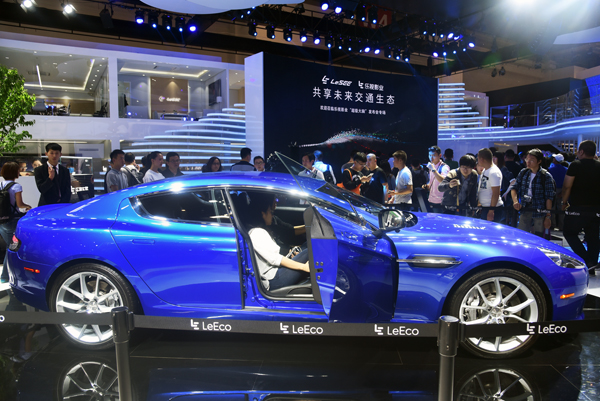 |
|
LeEco displays a car at its stand at the Beijing auto show in April. Provided to China Daily |
China's biggest iPhone maker, largest e-commerce company and leading internet-video producer are all in the hunt to build electric cars - and to grab the small pool of available talent to build them.
All of this is great news for marketing professional Ronan Lu, 32. The bidding wars are seeing some workers earning double their peers' salaries and others landing jobs with minimal experience, according to recruiters.
"Many companies offered me job opportunities with good payment, but I chose LeEco because I believe it has great potential," said Lu, who left Toyota Motor Corp to join LeEco's auto division in Beijing last month. "Startup electric vehicle companies usually can offer a higher salary than traditional automakers. You can get good rewards from stock holdings in such companies."
More than 200 Chinese companies - with backers including Terry Gou, Ma Huateng, Jack Ma and Jia Yueting - are developing 4,000 models of new energy vehicles and unveiling prototypes at motor shows and home electronics expos. Traditional automakers and a bevy of startups see opportunities in the government's commitment to boost yearly sales of new energy vehicles by a factor of 10 in the next decade.
China surpassed the United States last year to become the world's biggest market for new energy vehicles, which comprise electric vehicles, plug-in hybrids and fuel-cell cars. Domestic automakers sold 331,092 units last year, according to the China Association of Automobile Manufacturers.
In a country with severe urban air pollution and a rapidly urbanizing populace, the government has set a sales target of 3 million units a year by 2025.
"Internet companies that want to make cars are prying talents from us, and other rival automakers are also trying to lure them away," said Wang Jun, vice-president of Chongqing Changan Automobile Co. "It's not only increased human-resource costs but also changed people's expectations about their future."
The positions in top demand include designers, software developers and engineers focusing on systems architecture and creating "smart cities", said Shirley Xia, an auto-industry recruiter in Beijing for Aimsen & Company.
"For some positions that only emerged over the past couple of years, there aren't that many talents in the market," Xia said. "It's challenging for us to find candidates."
Salaries for key research and development workers have risen 30 percent this year, with some reaching 1 million yuan ($151,000), said Jennifer Feng, chief human resources expert at Shanghai-based 51job Inc.
Park Piao left Changan Automobile Group to run the research and development department for startup Zhiche Auto in Shanghai. Zhiche's chief executive officer is Shen Haiyin, who formerly worked for Chinese e-commerce company 360.com.
"I received quite a lot of offers from all kinds of companies before I decided to join Zhiche," said Piao, 38. "A startup company can be more focused on electric vehicle products and thus can achieve innovations more quickly."
Zhiche displayed a concept electric SUV before the Beijing auto show this year, complete with DeLorean-style doors that flip up. Zhiche plans to release the car next year.
There's also strong demand for branding and marketing specialists to help make household names out of startups with sights on initial public offerings.
"Part of this electric vehicle startup bubble can be explained by hot money," said Jochen Siebert, managing director of JSC Automotive Consulting in Singapore. "It reminds me a bit of the 1990s, when almost everything with internet or e-commerce was supported by private equity, and the stocks went through the roof."
A lot of that money is being spent on recruiting for the corporate suite, with companies backed by wealthy people hiring top executives from rivals and from Silicon Valley to help distinguish themselves.
Take Future Mobility Corp, an electric vehicle maker backed by Gou's Foxconn Technology Group and Ma's Tencent Holdings Ltd. The company hired Daniel Kirchert, who was president of Dongfeng Infiniti Motor Co, and Carsten Breitfeld, project manager for BMW AG's i8 plug-in sports car. Then it lured more managers from BMW.
"It is such a huge opportunity and advantage to start from zero," Kirchert said. "Our company offers a really big platform for talented people to reach their goals without hitting the glass ceilings they would have hit at traditional automakers."
Ma's Alibaba Group Holding Ltd is partnering with SAIC Motor Corp on an internet-connected SUV called the Roewe RX5.
Public subsidies that can total 60 percent of an electric vehicle's price are helping fuel a manufacturing boom. For the first half of this year, China produced 177,000 new energy vehicles, more than double the same period a year ago, the manufacturers' association said.
Bloomberg
